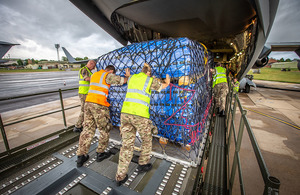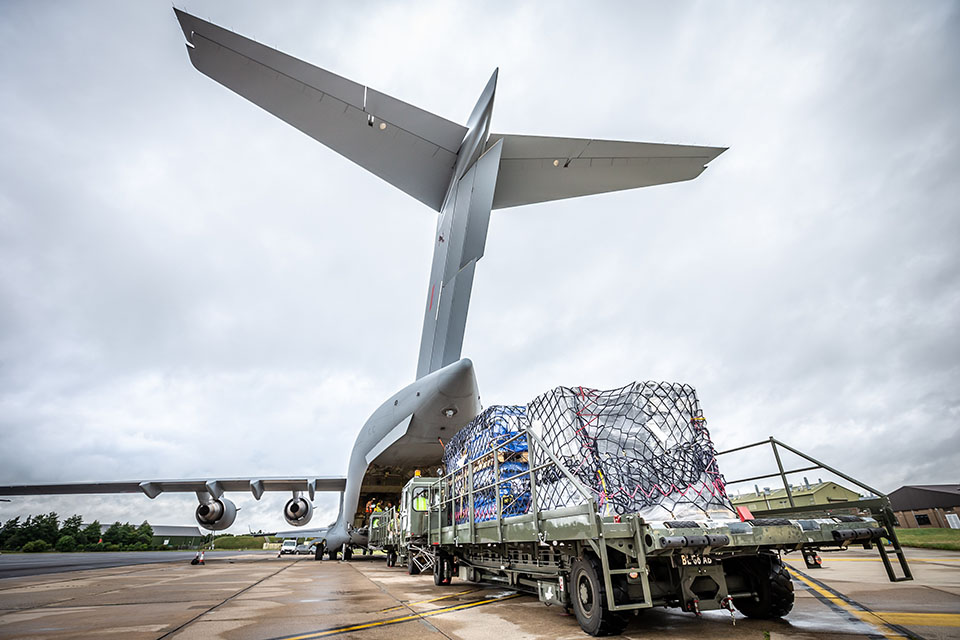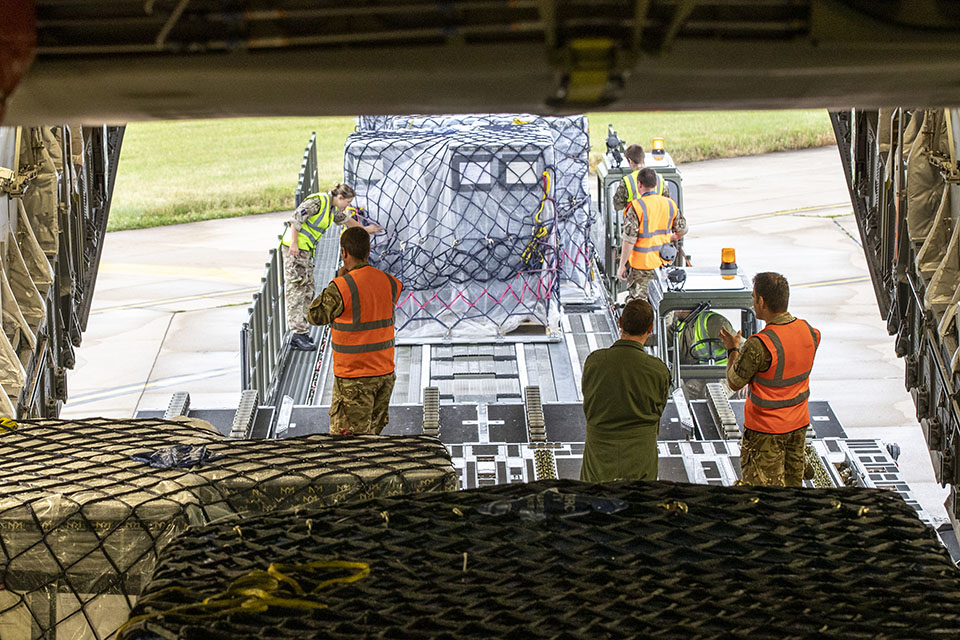RAF flights to take UK aid-funded supplies to Africa to tackle coronavirus
The first of a series of Royal Air Force flights taking medical supplies to Africa to help fight the coronavirus pandemic departed on Saturday, June 27.

Personnel load an aid cargo pack into the back of a C-17 aircraft. MOD Crown Copyright.
The RAF C-17 took off from RAF Brize Norton, Oxfordshire on a journey funded by the Department for International Development. The transport aircraft was carrying a field hospital, which will be used as a backup facility for front-line aid workers in the region. Aid workers from around the world are playing a crucial role in West Africa working to improve health systems, prevent the spread of coronavirus (COVID-19) and save lives.
It comes after the UK responded to a request by the United Nations (UN) to NATO’s Euro-Atlantic Disaster Response Coordination Centre. The UN is leading global logistics efforts to make sure medical supplies reach those who need them most during the pandemic.
With commercial flights disrupted and the cost of cargo flights having escalated, the UK’s support is crucial.
The UK-aid funded field hospital has been organised by the UN World Food Programme (WFP), and will have the capacity to care for up to 92 people.
The UK has previously announced £15-million of support to the WFP to support its coronavirus response.
International Development Secretary Anne-Marie Trevelyan said:
This field hospital will play an important role in the global battle against coronavirus.
Aid workers are on the front-line of the coronavirus response, and it is critical they are protected so they can continue their life-saving work.
This is the best of British – the UK military and UK aid – working together to solve a global problem for the benefit of all of us. No one is safe until we are all safe.
The field hospital, which weighs approximately 130 tonnes, the equivalent of seven buses, will be transported to Accra in up to five flights. It will then be built to support the coronavirus response where the need is greatest.
Defence Secretary Ben Wallace said:
The RAF and NATO are always here to help our Allies, friends and those in need around the world. I’m proud that while dealing with coronavirus we are able to provide such support to Ghana and other countries.
The World Food Programme’s Executive Director, David Beasley, said:
WFP is incredibly grateful for this support from the UK Government in transporting essential humanitarian infrastructure and medical supplies to Africa. Commercial transport is massively disrupted.
This kind of action allows humanitarian and health staff to stay and deliver at their duty stations on the front-line to battle the COVID-19 pandemic.

Cargo sits waiting to be loaded onto a C-17 aircraft. MOD Crown Copyright.
NATO Secretary General Jens Stoltenberg said:
NATO Allies are working together to address the COVID-19 pandemic and to support our partners. Last month, NATO agreed to support the UN’s global call for airlift assistance. I warmly welcome that the United Kingdom is the first NATO Ally to come forward with an aid flight, delivering supplies to build a field hospital in Ghana. This is a concrete demonstration of solidarity in action – NATO Allies stepping up to save lives.

Personnel loaded the C-17 aircraft as it prepared to take off. MOD Crown Copyright.
Notes to editors
- Up to £1.2-million of UK aid money has been made available to cover the costs of the military flights.
- The Department for International Development and Ministry of Defence have offered support to WFP, which is setting up the logistical infrastructure on behalf of the UN, so the international health and humanitarian response can continue during the coronavirus pandemic.
- The Euro-Atlantic Disaster Response Coordination Centre (EADRCC) is NATO’s principal civil emergency response mechanism in the Euro-Atlantic area. It is active all year round, operational on a 24/7 basis, and involves all NATO Allies and partner countries. The Centre functions as a clearing-house system for coordinating both requests and offers of assistance mainly in case of natural and man-made disasters.
- Images are available to download here